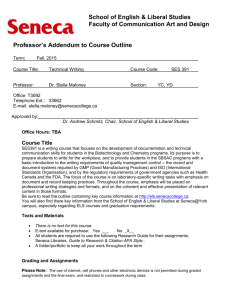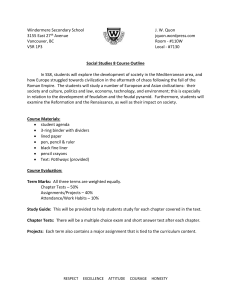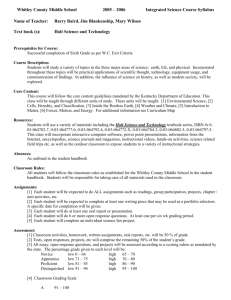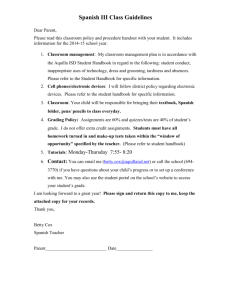SES 391 W2015
advertisement
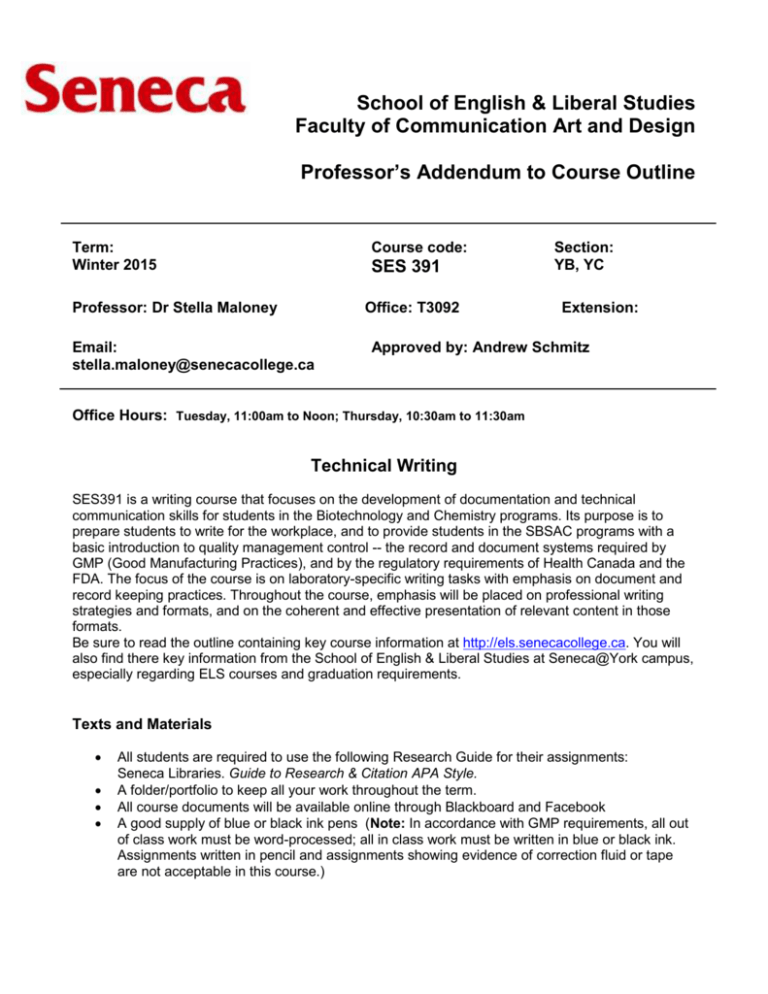
School of English & Liberal Studies Faculty of Communication Art and Design Professor’s Addendum to Course Outline Term: Winter 2015 Course code: SES 391 Professor: Dr Stella Maloney Office: T3092 Email: stella.maloney@senecacollege.ca Section: YB, YC Extension: Approved by: Andrew Schmitz Office Hours: Tuesday, 11:00am to Noon; Thursday, 10:30am to 11:30am Technical Writing SES391 is a writing course that focuses on the development of documentation and technical communication skills for students in the Biotechnology and Chemistry programs. Its purpose is to prepare students to write for the workplace, and to provide students in the SBSAC programs with a basic introduction to quality management control -- the record and document systems required by GMP (Good Manufacturing Practices), and by the regulatory requirements of Health Canada and the FDA. The focus of the course is on laboratory-specific writing tasks with emphasis on document and record keeping practices. Throughout the course, emphasis will be placed on professional writing strategies and formats, and on the coherent and effective presentation of relevant content in those formats. Be sure to read the outline containing key course information at http://els.senecacollege.ca. You will also find there key information from the School of English & Liberal Studies at Seneca@York campus, especially regarding ELS courses and graduation requirements. Texts and Materials All students are required to use the following Research Guide for their assignments: Seneca Libraries. Guide to Research & Citation APA Style. A folder/portfolio to keep all your work throughout the term. All course documents will be available online through Blackboard and Facebook A good supply of blue or black ink pens (Note: In accordance with GMP requirements, all out of class work must be word-processed; all in class work must be written in blue or black ink. Assignments written in pencil and assignments showing evidence of correction fluid or tape are not acceptable in this course.) Grading and Assignments Presentation and Report (1 oral 10%; 1 literature review, 5%, 1 report, 10%) SOP (1 x5%; 1 x 10%) WI Specification Lab Record Change Control Request (2 x 10%) Purchasing Final Exam 25% 15% 5% 5% 5% 20% 5% 20% Please Note: The use of internet, cell phones and other electronic devices is not permitted during graded assignments and the final exam, and restricted to coursework during class. Consistent with Seneca College policy for English and Liberal Studies courses, the term work for courses within this School of English & Liberal Studies includes a minimum of 250 pages of reading and 2000 words of writing. TENTATIVE WEEKLY SCHEDULE WEEK 1 Jan 12 - 16 2 Jan 19 - 23 3 Jan 26 - 30 4 Feb 2 -6 5 Feb 9 -13 6 Feb 17 - 20 Feb. 16th – Family Day TOPIC READING Introduction to Control Quality Management Workflow and High Level Documents The Specification GMP Writing Sample GMP Assigned: Group Report; Literature Review Assigned: Specification SOP SOP GMP SOP/ Working Instruction ASSIGNMENT In Class: First SOP Due: Specification Assigned: Second SOP In Class: Working Instruction Assigned: Lab Record Audits, Logs, and Lab Records Audits, Logs, and Lab Records cont’d; Purchasing GMP; Audits, Logs, and Lab Records GMP; Audits, Logs and Lab Records Purchasing and Requisistions 8 Mar 9 - 13 Reporting OOS Reporting OOS Results Assigned: OOS Report Reporting Deviations: Change Control Process Change Control Process 9 Mar 16 - 20 10 Mar 23 - 27 Reporting Research Reporting Research Assigned: Deviation Report Due: OOS Report Due: Deviation Report 11 Mar 30 - Apr 2 April 3rd – Good Friday Reporting Research 7 Feb 23 - 27 In Class: Purchasing Quiz; Audit Checklist Due: Second SOP; Lab Record STUDY WEEK Mar 2 - 6 Due: Literature Review 12 Apr 6 - 10 Oral Presentations Due: Group Report 13 Apr 13 - 17 Oral Presentations Due: Group Report 14 April 20 - 24 Exam Week Wednesday, April 22 See SIRIS exam schedule for time & location. Exam attendance is mandatory. Class Standards Format: Only work with a neat professional appearance will be accepted for grading. Out-of-class assignments must be word- processed. Late Assignments: Unless an extension has been granted, a late out-of-class assignment will be penalized at a reduction of ½ letter grade per school day with a one-week maximum for submission. Missed Assignments: Along with prior notification, you may be asked to provide medical/legal documentation. Make-ups are granted at the professor’s discretion. Grading Policy A+ A B+ B C+ C D+ D F OR EXC SAT UNSAT 90% 80% 75% 70% 65% 60% 55% 50% 0% to to to to to to to to to 100% 89% 79% 74% 69% 64% 59% 54% 49% (Not a Pass) Excellent Satisfactory Unsatisfactory Evaluation Evaluation is based on correct language usage, organization and mastery of the course at a postsecondary level. Students are expected to learn professional standards of performance in the course areas, and tests and assignments will be graded on that basis. In recognition of the significance of exceptional communication skills in the work place, marks are deducted for language errors on all tests and exams. A student can be failed on the basis of language errors alone. Attendance and Participation Consistent attendance is expected as it contributes to student success in this course. If you will be absent from class, please notify me by phone or e-mail. You are still responsible for the material and assignments missed and will be required to provide documentation. For extensions or special considerations, make the request to me well in advance of any due dates. Considerate classroom conduct, adequate class preparation, and constructive participation will enhance your academic experience and that of your colleagues. In particular, you are asked to contribute to the learning environment by being prompt, courteous, responsible and collaborative, and by following the behavioral policies listed in the College Academic Policy and the Student Handbook. Student-Faculty Consultation outside Class Hours Please arrange times with me during office hours to discuss your work and progress in this course. Learning Centre For free assistance with English, study skills and some course content, visit our Learning Centre and make an appointment with one of our tutors. Tutors can offer guidance and help you remedy writing problems, but will not proofread or correct grammar or alter content. Visit the Learning Centre in Room S1120 or book an appointment online at https://www.senecac.on.ca/wabs. Dropping a Course There are two deadlines for dropping this course. If you drop by Day 10 of the term, the course will not appear on your transcript. If you drop by the last drop date (see Student Handbook), the course will appear on your transcript with a grade of DNC. To drop, please notify your professor, complete a “Timetable Change Form,” and return it to Registration by the deadline. Discuss any possible negative consequences of dropping the course with your ELS Coordinator. PLEASE RETAIN THIS DOCUMENT FOR FUTURE EDUCATIONAL AND/OR EMPLOYMENT USE. Academic Regulations It is your responsibility as a student of Seneca College to be aware of and abide by the academic and behavioural policies outlined in the College Academic Policy and the Student Handbook. Here are some key policies: Academic Honesty (Section 9 and Appendix E - Academic Policy) “Engaging in any form of academic dishonesty to obtain any type of academic advantage or credit is an offence under this policy and will not be tolerated by the College. The penalty for a first academic honesty offence is a grade “0” on the work in which the offence occurred and will result in a comment being placed on the transcript by the Academic Honesty Committee. The penalty for the second academic honesty offence is an “F” in the course where the offence occurred, a second comment on the transcript and suspension from the College for a time period determined by the Academic Honesty Committee normally for a minimum of three (3) terms.” For more information on Academic Honesty, go to: http://library.senecacollege.ca. Student Appeals (Section 12 – Seneca College Academic Policy) Students have the right to appeal academic decisions of the College. The procedures for informal and formal appeals are outlined in Academic Policy. If a student disagrees with the evaluation of an assignment or with a final grade, s/he must first discuss the matter with the professor in an attempt to resolve the disagreement. If the matter is not resolved, the student should discuss the problem with the Coordinator or the Chair of English and Liberal Studies. Students must keep all assignments (including drafts and outlines) and exercises until they receive their final grade. No appeal will be considered unless a complete file is submitted at the time of the appeal. Information Technology Acceptable Use See the Student Handbook. Faculty and students are reminded that College correspondence should only be disseminated electronically through official College-provided e-mail. Alternate e-mail addresses such as Yahoo mail or Hotmail mail are not authenticable through Seneca. Copyright – See the Student Handbook There are limitations to reproducing materials from texts and other copyrighted materials. Essential copyright information is available in the Student Handbook and at http://library.senecacollege.ca. Students Rights and Responsibilities - See the Student Handbook Discrimination and Harassment – See the Student Handbook All students and employees have the right to study and work in an environment that is free from discrimination and/or harassment. Language or activities that defeat this objective violate the College Policy on Discrimination/Harassment and shall not be tolerated. Information and assistance are available from the Resolution, Equity and Diversity Centre. Accommodation for Students With Disabilities The college will provide reasonable accommodation for students with disabilities in order to promote academic success. If you require accommodation, contact the Counselling and Accessibility Services Office at ext. 2900 to initiate the process for documenting assessing and implementing your individual accommodation needs. Approved by: Andrew Schmitz, Chair, School of English and Liberal Studies
